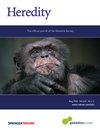量化桉树的遗传和基因型增益差距:忽视近交和优势的隐性成本。
IF 3.9
2区 生物学
Q2 ECOLOGY
引用次数: 0
摘要
了解桉树的交配系统是准确估计遗传参数和改进育种计划的必要条件。桉树物种经常表现出混合交配系统,导致后代之间的复杂关系。传统的树木育种计划假设开放授粉(OP)试验的半兄弟姐妹关系可能会高估遗传收益,而忽略了近亲繁殖和优势的影响。本研究以具有混合交配系统的棕桉为研究对象,量化了自交和优势对其繁殖策略的影响。我们模拟了100个随机选择的家庭的OP试验生长数据,采用随机完全区组设计,使用已公布的胸径估计参数(DBH)。我们的分析表明,与基于家系的模型相比,基于标记的模型,特别是那些包含显性效应的模型,提供了更准确的遗传参数估计和更大的预测遗传收益。这些结果揭示了当采用传统模型时明显的遗传和基因型增益差距,强调整合优势信息基因组选择策略的必要性。因此,我们的研究为优化育种方案以持续提高桉树人工林的生产力和遗传质量提供了重要的指导。本文章由计算机程序翻译,如有差异,请以英文原文为准。

Quantifying genetic and genotypic gain gaps in Eucalyptus: the hidden cost of ignoring inbreeding and dominance
Understanding the mating system of Eucalyptus species is necessary to accurately estimate genetic parameters and improve breeding programs. Eucalyptus species often exhibit mixed mating systems, leading to complex relationships among progenies. Traditional tree breeding programs that assume a half-sibling relationship for open-pollinated (OP) trials may overestimate genetic gains by neglecting the effects of inbreeding and dominance. This study focuses on Eucalyptus pellita, a species with a mixed mating system, to quantify the impact of selfing and dominance on breeding strategies. We simulated OP trial growth data for 100 randomly selected families in a randomized complete block design, using published estimated parameters for diameter at breast height (DBH). Our analysis indicated that marker-based models, particularly those incorporating dominance effects, provide more accurate genetic parameter estimates and larger predicted genetic gains than pedigree-based models. These results reveal pronounced genetic and genotypic gain gaps when traditional models are employed, underscoring the imperative for integrating dominance-informed genomic selection strategies. Thus, our study provides essential guidance for optimizing breeding programs to sustainably enhance productivity and genetic quality in Eucalyptus plantations.
求助全文
通过发布文献求助,成功后即可免费获取论文全文。
去求助
来源期刊

Heredity
生物-进化生物学
CiteScore
7.50
自引率
2.60%
发文量
84
审稿时长
4-8 weeks
期刊介绍:
Heredity is the official journal of the Genetics Society. It covers a broad range of topics within the field of genetics and therefore papers must address conceptual or applied issues of interest to the journal''s wide readership
 求助内容:
求助内容: 应助结果提醒方式:
应助结果提醒方式:


